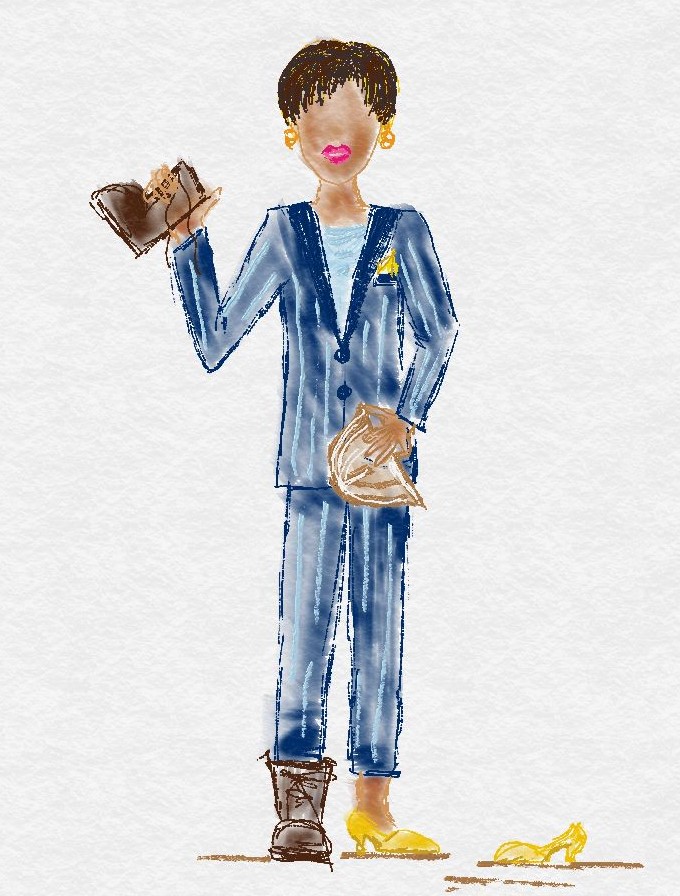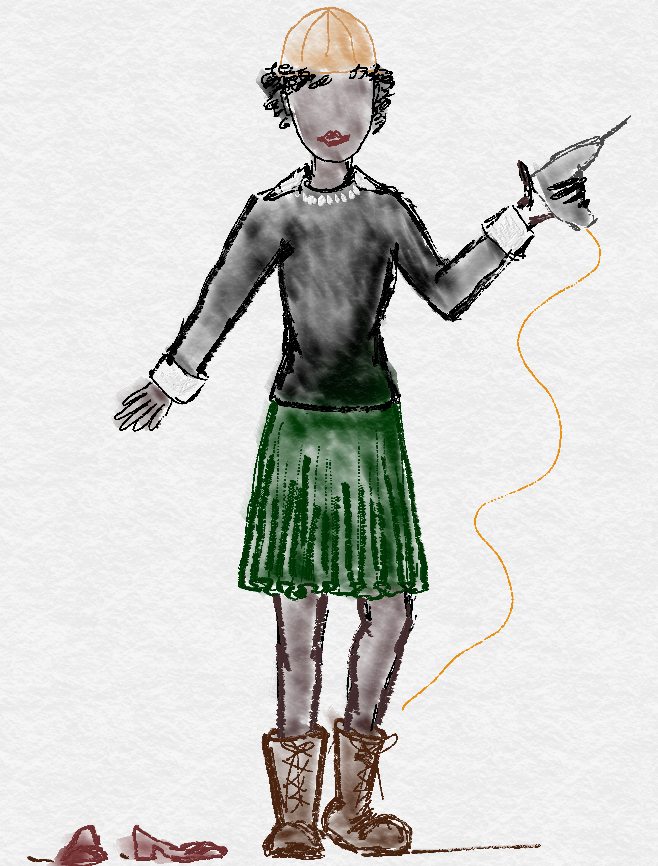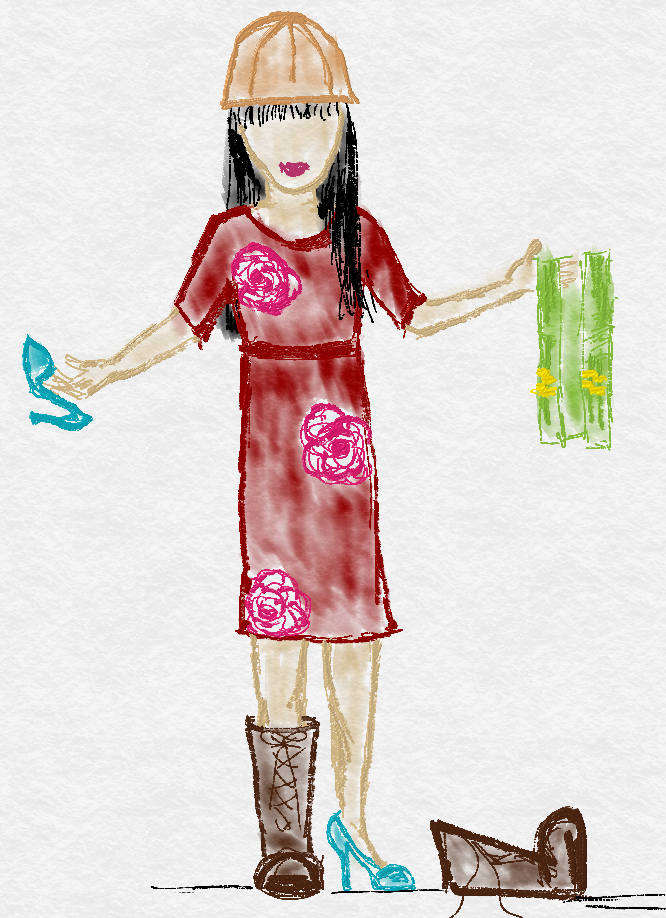Visibility
Checking Out
The Top of the Hill Is in Sight

Don’t say this out loud, because we don’t want to jinx it, but it looks like we might be starting to, maybe, sort of, in a subtle way, approach the outer edge of the zone that’s right before the stage that leads eventually, circuitously, to the end of the tunnel. Notice I didn’t say anything about seeing a light? And also notice that I didn’t describe this status in any definitive or affirmative way? Hey – I’m an engineer, after all. They train us to manage expectations.
So, at the backs of our minds somewhere, behind the piles of toilet paper and the new recipes for sourdough bread, we’re toying with the idea that someday before the turn of the next century we might be emerging from our houses and apartments and barns or wherever we have been sequestered for the past 632 weeks. Not all at once. Certainly not. If you think there will be a day on the calendar where all of a sudden everything will go back to normal, I’m afraid your biscuit isn’t quite done in the middle. No, our release back into the wild will be slow and controlled and fraught with danger. We know that we’ll never, ever, ever be touching other human beings again, but we might actually get to see some.
The question here is: can we make some hay out of this possibility of sunshine? As proactive professional women, we’re always looking for chances to get ahead, to make life better. Are there any opportunities here?
When I was running cross-country, I had a coach who liked to run us through “check out” drills. He theorized that the average runner would experience a slight moment of relief right when she would get to the top of a hill. This slight pause, however small, would give a competitor a chance to capitalize on the situation and make up ground by doing the opposite and accelerating. We spent endless hours running to the tops of hills and accelerating right as we got over the crest.
I give my old coach a lot of credit – the technique worked every time. If I had runners in front of me or near me, I usually could pick off at least a couple of people as we all reached the top of a hill.
There is no doubt the world will be breathing a sigh of relief in staggered phases as countries reach conditions where some parts of society can be restarted. Similarly, your co-workers, clients, and competition will be happily settling back into their (child free!) offices and jobsites. A short “honeymoon” period of a few weeks is to be expected while people see each other again and luxuriate in the routines they didn’t know they loved.
This is the top of the hill. It doesn’t matter that we’re not physically there yet. If you can see it, or even envision it, you need to be thinking about checking out.
So what does that mean for you? It can mean a lot of different things, depending on your position.
If you are an employee, particularly an entry-level person, you need to do some investigating and observing to figure out what avenues you might have for advancement. Your employer most probably has been tap dancing on an unfamiliar dance floor for the past six weeks, trying to figure out how to keep work going, keep paying employees, and keep clients happy. What have been the biggest needs? Not your biggest needs – your employer’s. What has been the biggest stumbling block internally? Has it been communication? Have you had trouble getting feedback from clients who are also navigating seas inhabited by heretofore unknown monsters? What can you do to help with this? Remember, your goal is not to figure out how to make your life better. Your goal is to figure out how you can be a valuable employee at a time when your employer likely is tearing out her hair. Volunteer to do something you’ve never done before. Offer to brainstorm about ways to solve problems. As my dad used to say to us when something needed to be done around the house, make yourself useful.
A very smart lady once told me that you don’t understand someone’s character when life is good. You get a sense for who someone really is when things are bad. She was absolutely right, and the same philosophy applies to employees. Don’t be the person whining about how the project you were excited about just got postponed and now you’re going to have to work on something boring. Be the person who volunteers to call clients and ask what your company can do for them in this tough time. Be the star who formulates a revolutionary new way to facilitate in-house communication and actually has the nerve to submit it to her boss.
The same can be said for people who own their own businesses. This is the time to call clients and offer help…or a shoulder to commiserate on (socially distant, of course)…or just some time to listen to how completely screwed up their project has become during the pandemic. Put yourself in front of people and let them know that your problems aren’t getting in the way of being an indispensable resource. Check out.
I hope a number of you are getting excited as you read this. We’ve had a lot of darkness for quite some time, and this might be a little bit of light in your life. On the other hand, it’s critical that we acknowledge that another sector of our group might be reading this with the exact opposite reaction. “Seriously? Are you kidding me? I am barely surviving right now, and you want me to be ambitious and proactive? I just did three conference calls with a toddler on my lap, and I have to feed five people in the next hour AND I’M EXHAUSTED. Do you really want me to do more?”
Actually, I don’t. Let’s be honest – everyone has lived through this nightmare in different circumstances. If you have been working at home while homeschooling your kids and taking groceries to at-risk relatives, you’re a hero. Take a nap when this is done and think about your colleagues who are checking out as you drift off to sleep. If you are exhausted from riding the subway with a mask on while trying to stay distant from idiots on your way to your jobsite every day, you need to appreciate the fact that you made it through this without getting sick and without killing anyone. Applaud your friends who live in wide open spaces who are going to strategize on how to use this situation to take a step forward. Despite the fact that some of us want to optimize every possible opportunity and participate in everything all the time, that’s not real life. You are human. It’s time to take a break. Don’t check out.
If you are sheltering in place with a bunch of little ones (or even medium ones), you have had the honor and sacred responsibility of keeping them safe during a disaster. And you did it. That’s as good as crushing a micropile design, trust me. You might not see it that way from your perspective on the ground now, but 20 years in the future you’ll appreciate what you did. (And you’ll be sure to tell your kids how easy they have it as parents). In the meantime, you can cheer on your fellow female professionals who will be making progress for all of us.
So think about checking out, if circumstances apply. If they don’t, please support those who can. Sometimes we have to pass up opportunities, but we can be happy knowing that our sisters are out there, making phenomenal strides in our places.
The Others
More is Better

By Guest Contributor Lori Simpson
(Editors’ Note: Lori is our hero. You can read her brilliance here. If you are lucky enough to meet her in person, pay attention).
The “Member Voices” article in the May 2019 ASCE Civil Engineering magazine hit home for me. Hannah Workman, a student at Fairmont State University in West Virginia wrote about sexism in engineering. No, this is not what you are thinking—she was referring to a different kind of sexism: the kind that we women perpetrate on each other. Her angle was about senior female engineers who show favoritism or give a preference to male engineers over female engineers. After giving some examples, she concluded that it is a territorial issue: senior female engineers were probably the only one at their firm and had to fight just to obtain that spot. They would see other women as competition.
I am a senior female engineer. I have been in the industry since 1986 and have often been the only woman in the room (or jobsite). This still happens, so I know many of you can relate. There are many reasons why having limited diversity on a project may not result in a project’s best outcome – not enough diversity of thought or experiences can prevent some great ideas from coming out. But there is another effect that happens, and I am here to testify to my own shortcomings: I take pride in being the only woman in the room. There. I said it. It is a badge of honor that I have enjoyed wearing, and if I am being really honest with you, deep down I still do. Being the only woman in the room means you are tough. The problem is that you can only wear this badge if you are the only woman in the room. The side effect of this situation is that I did feel competitive with other women and did not do what I could to help other women achieve in their careers.
The good news is that I am working on reforming myself, with the help of many of my peers in the industry. Initiatives like DFI’s Women in Deep Foundations (WIDF), the SE3 Project, AIA’s Equity by Design, and my own company’s Women@Langan have opened my eyes and are providing me strategies for mentoring and advocating for women. When WIDF had its inaugural meeting, one of the women in the room asked, “How many of us come to the DFI conference and never say hello to other women?” Guilty. Even at a conference I felt competitive with the handful of other women there (glad to say – there is way more than a handful of women at DFI now). As I am confessing this, it seems so silly – it’s not like I’m competing for attention from the men at the conference. I was competing to be the Toughest Woman. But guess what? It turns out that it is way more fun when there are many of us. Now I revel in walking into a room and seeing LOTS of bad-ass women.
So I realized that I need to help make this happen, especially in my position as a senior female engineer in the industry. At first I thought that because I figured it out, others would too–that just being an example was sufficient. I saw a lot of smart, hard-working women around me and figured they would know what to do. But when you really start to talk, you realize that you need to tell your story. And while we have a lot of shared experiences, we learn from how we each dealt with them. So I tell the stories of being out in the field with no proper facilities, being the only woman on a construction site, not being listened to. I share how I got the flexibility I needed while raising my daughters, how I advocated for fair pay, and how I presented my qualifications to get the promotions that I sought. I talk about how I developed my confidence, my voice. It’s not bragging—it’s making sure we know we aren’t the only ones going through this.
I’ve also realized that I can use my hard-won position to advocate for change. I can give a hand to those women working up the ladder, both in my company and in others, because one of the spoils of being a Tough Woman for so many years is that now I’m part of the decision-making team.
So let’s keep the conversation going. If we don’t help each other out, we are perpetuating the isolation of women in our field. Madeleine Albright said, “There is a special place in hell for women who don’t help other women”. I don’t want to end up in hell.
Sweet and Salty
For All Our Galentines

This is a week of treats, and we all like something salty and sweet, don’t we? So here is our offering to you for your morning or afternoon snack – or your midnight munchie. Something salty and something sweet.
Salty: The Spread
This morning was the fourth time in the past few months that I was subjected to what I have come to call The Spread. Sitting in my airline seat with my belongings tucked beneath the seat in front of me, I suddenly felt pressure on my right leg. I looked over and… there it was. The man in the seat next to me had settled into a comfortable position that included his legs forming a 90 degree angle, aka The Spread. About 25% of his leg mass had drifted into my seat space and was encroaching on my useable area.
I did what I normally do when this happened today – I ever so slightly pushed back, giving the guy a subtle “Hey, you’re in my space” nudge. But, as so often occurs, he was oblivious. I spent the rest of the thankfully short flight with even less room than current airplane seat measurements allow. By the time I got off the plane, I was irritated and resentful. The whole situation was even more puzzling when the guy turned out to be a very considerate gentleman when it came time to unload bags from the overhead compartments and disembark the plane.
I realize that this issue is but a small slight in the general realm of sexism, and I should be happy that I was on a plane because I have a job where I am unconstrained by sexist bosses and I get to travel to work for enlightened clients. On the other hand, the plane scenario, and its commonality in other places, feels a bit to me like a metaphor for women’s places in the world and the current state of our progress. There seem to be a number of guys who still want to stress that this is their world and they’ll encroach and make us uncomfortable if they want.
Certainly some of you are yelling at me right now, “Just tell him to move!” And yes, this also illustrates that not all of us are comfortable with just calling a guy out directly for his rude or sexist behavior. My southern sensibilities discourage it. My feeling is that it’s not a big enough deal and it will make the rest of the trip uncomfortable. What I actually would like to do would be to say, “Look – if you have a fungus and you’re uncomfortable, go get some medicine, but get out of my space!” But my sensitivity to other’s feelings tells me that maybe he doesn’t even know what he’s doing and perhaps he would be really embarrassed if I called him out directly.
‘And maybe that’s the real lesson here. Maybe he doesn’t realize what he’s doing. Of course, some percentage of the guys who Spread are completely aware of their actions, because there will always be jerks EVERYWHERE. But maybe some of these guys on planes and in stadiums are just like guys at work who interrupt us and push us out. Maybe their behavior was learned at an early age and they don’t realize its implications. So the proper response would be to clearly point out the issue, but without animosity. “Excuse me, would you mind moving your leg?” might be in the same league with “Could you work on not interrupting me during meetings?” If he responds badly, he’s a jerk being a jerk, not a good guy being clueless. And you can proceed accordingly. In fact, perhaps you can diplomatically educate the men in your life (husbands, fathers, brothers, sons, shoe salesmen) that to Spread is to be inconsiderate. Revolutionary behavior doesn’t always involve hostile confrontations, and sensitivity to other people being human often results in allies.
Sweet: Happy Valentine’s Week!
If you have been reading here for a while, you know that I am a perpetual optimist. On a crowded, noisy train I remind myself that some people never travel more than 5 miles from their homes. When my basement flooded, I said it was an opportunity to remodel. Other than the first week after football season is over, I can almost always find a way to summon a positive angle on a situation. It’s my survival mechanism.
As such, no one should be surprised that I love Valentine’s Day. Even absent a current Significant Other, I think it’s quite a fabulous holiday. The decorations are pretty, the movies on TV are sappy and hopeful, and every person has an opportunity to tell the people around her that she loves them.
Some among us are very cynical about the holiday, citing pressure on gifting, commercialism, and “It’s a made-up holiday”, as some of their reasons for being negative. (What holiday isn’t made up? Not even Jesus said, “Hey – make a really big deal about my birthday.”)
But I feel the opposite. I think this is a gift-wrapped chance to appreciate people, in case you’ve been too busy to do so. There is no law that says the person you are honoring is your sweetie. It could be your mom, your former teacher, your kids’ nanny – anyone! A positive sentiment is never a bad idea. And reminding yourself of all the good things in your life is a beneficial exercise whenever it may occur.
I have said something here before that bears repeating: Happiness is hard. Cynicism is easy. Negativity, skepticism, distrust, disbelief – all of these are conditions that some people would have you believe are the signs of intelligence. In fact, they are signs of fear. It is easier to be cranky and cynical and tell everyone that you didn’t ever expect to be treated equal to men in your job anyway, and all the men out there are malicious jerks. It’s hard to have hope. It’s brave to take the chance that your new boss really will support you in a male-dominated environment, and you’ll get to explore your career opportunities unfettered by the ignorance of others. Optimism and love are accompanied by the risk that your hopes will be dashed. But if the potential win is that you will realize your own goals and aspirations, or perhaps you’ll find happiness in another person, how can you afford to be negative and skeptical?
In the spirit of the season, I would like to say how much I care about all of my sisters in arms and everything you give me on a daily basis. I am constantly inspired and supported and encouraged by you, and you make my life a richer, more fulfilling existence.
I also appreciate all of the men who treat us as equals, fight for our progress, and don’t encroach on our figurative airline seats. I heart you guys, and I thank you for the daily dose of happiness you give me and others.
There will be crises and problems in our lives, but there also always will be goodness and love. I hope you can find some reason to be optimistic and grateful during the Valentine’s holiday. If you’re at a loss, message me and I’ll send you a list of shoe sales.
Are You Sure About What You Didn’t Say?
90% Ready for Change, 10% Irritated

By Guest Contributor Lori Simpson, (who we’re 90% sure is CGG (Chief Geotechnical Genius) at Langan)
On a recent conference call my headset microphone wasn’t working and I couldn’t speak. Many people on the call didn’t notice the difference, well, because how often do women speak up on conference calls…or in meetings for that matter? Ok, ok, don’t get indignant. Of course we women speak. Some might say we are Chatty Kathys (no knock on Kathys) or that we “pick a little talk a little, pick a little talk a little, cheep cheep cheep talk a lot pick a little more.” (Any fans of the Music Man? I played Miriam’s mother in my middle school production). So how did we women get the reputation for talking too much when we don’t speak up enough?
They say that a woman needs to be 90% sure about something before she speaks up but a man only needs to be 10% sure. I see this in meetings all the time. When I was a junior engineer, I would go to meetings with a senior engineer (male, obviously, as there were no female senior engineers in my world). I would practically kick him under the conference room table because of some of the stuff that would come out of his mouth. No, he wasn’t being disrespectful; he was saying things that were flat out incorrect. As the junior engineer, I knew the details of the project,so I would know when he was wrong. Later, as I became the lead geotechnical engineer… (I’m not going to say I was senior, because well, that would speak to my age and we aren’t going there in this post…although there has been some previous discussion about my age, and I will speak to that in another post someday)…okay, where was I? Oh yes, being the lead engineer and sitting in meetings. Every time a question came to me I would take time to think and slowly respond with an answer that had a lot of qualifiers: “if”, “likely”, “might”, “could”, etc. Basically I knew there there was not an absolute answer (in geotechnical engineering there never is), so I made it clear that I was not asserting one definite position. So often in these meetings I would get a sense of dissatisfaction about my response. I think I was dissatisfied too. How come I couldn’t give a definite answer like EVERYONE else in the room? Note that everyone else was male (I’m sorry if I keep stating the obvious…but hopefully it’s not that way now so our younger readers might not think it’s obvious). It wasn’t because I was shy. It wasn’t because I felt like I shouldn’t be there. It wasn’t because I didn’t know what I was doing. So WHY?
At one point I attended a conference called Groundbreaking Women in Construction. This conference is alive and well and you should go. And while you are there, call me because it’s always in SF and I would love to meet you for a drink. But I digress. I attended a panel on the different leadership styles of men and women. This was the first time I had ever heard about this -what? Men and women are different? This was an eye opener. I mean, I grew up in the era of Men are from Mars and Women are from Venus, but I had never read it, and I didn’t think it applied to the working world (maybe because I had never read it?) One of the things that was presented was that women need to be something like 90% sure and men need to be only 10% sure before speaking up. GAME CHANGER!
I knew that when the senior engineer spoke incorrectly, he was saying what others wanted to hear—a confident answer. I also knew that he didn’t know all the details so he couldn’t give the entirely correct answer. What I didn’t know was that him knowing just enough about the project meant that he felt confident to give an answer. After that conference session, I noticed what was happening. All the men in the room knew just enough and spoke freely and sometimes incorrectly. The women (ok, woman) in the room wasn’t always 90% sure so she didn’t speak up…or when asked, gave an answers with lots of qualifiers so that the 10% she didn’t know was covered.
So does this mean that the outcomes of meetings with all or mostly men are based on an inadequate amount of information? Does it mean that the wrong conclusions are made? I would say generally no. Maybe it takes more meetings to get to the final answer because if you only know 10%, it might take you 10 meetings to get to the solution. And because women aren’t speaking up, even though they know 90%, they aren’t helping everyone get there. I don’t really believe in this math, but it makes me wonder -should men be more prepared and consider their responses before they give them? Or should women be more willing to “go out on a limb” when they don’t have all the information? On the one hand it seems obvious that the men should be more prepared and only speak up when they know more about the subject. And if a woman actually speaks up, you should put 9 times more weight on her answer. But I think there is value in the “brainstorming” method that I think occurs in meetings with men.
Ultimately, my observation is that people want you to speak up. They want to hear what you have to say. You are there for a reason, hopefully at a high billing rate, so contribute. You can put in an “if” or a “likely,” but they want you to sound confident. You might give the reasons why it is not a sure thing. Or you might say that this is the way you think it should go but there are some risks that you can explain. Either way–be confident.
After I heard the 10%/90% philosophy, my competitive nature erupted and now I try to speak up in meetings just to compete with the men for airtime. I watch how interruptions are made and how they speak over each other and join in the fun. And as long as I know at least 10% about what I am talking about, I’m on equal ground.
Shades of Gray
We Can Do It…Even Better Now

If you follow our little blog and read the comments from our readers, you might have seen a rather pointed comment on our introduction of our contest winner, Lori Simpson, back in December. After we listed all of Lori’s lengthy accomplishments, I suggested that this was all very impressive because Lori was only 25. The implication, of course, was that it would be more desirable if Lori were 25 than her actual age, which is not my business to disclose. (I wasn’t raised by wolves). One of our readers expressed her dismay at the joke and suggested that we stop acting like younger is better and start showing some respect for the accomplishments and benefits of age.
Okay, just between us chickens, my initial reaction was not one that appreciated her insights. In fact, I think the mumbling alone in my office went something like, “Oh sure – you’re probably, what? 35? If that? I’ll bet you don’t spend a good portion of your time trying to keep your rear end from hanging down to the backs of your knees. You probably don’t even know what Retinol is. You have maybe one wrinkle? And you probably told all your friends about how horrible it is. Just wait until your face looks like a topo map and then talk to me about how great age is. You’ll just love it when you look like Mrs. Claus and all the guys just want you to bake them cookies.” There might have been some uglier rambling, but I’ll spare you that.
Over the next few days, I kept thinking about her comments. The more I thought about it, the more I realized that she was right. I hate it when that happens. My attitude about my own age in fact does nothing more than contribute to accepted social negativity. As long as I focus on the drawbacks of maturity and fail to celebrate the benefits, I’m just making the problem worse.
So I need to embrace the beauty of maturity and wisdom and stop acting like younger is better. This is nothing we all haven’t read in a thousand magazines. Extol the mystique and allure of my accumulated years and celebrate the fact that I have a lot more career experience and knowledge than the average bear. Appreciate that I am in a position now to help my clients and contribute professionally with a unique perspective based on a long history of project execution and successes.
Fabulous. So I conceded my error (even though our beloved reader never knew of my solo rant) and issued a retraction in the form of a Solution Feature that embraced the value of age.
But the issue kept bugging me. There was something missing from this newly accepted perspective. Even though I was not drinking wine at a café in Paris, adorned with an artfully arranged scarf and chatting with the most recent in a string of fabulous lovers, I could see myself better in the framework of an accomplished woman of 50. (There, it’s out there. It only took 45 minutes for me to type that number). But the career side didn’t fit. So I had to sort through it to understand why.
Many times I’ve been with my dad at a site, and an owner or a contractor or another engineer has listened to him and not me. I can’t count how many times he’s said to me, “You just don’t have enough gray hair.” To which I usually replied, “I have a salon to make sure that never happens.” It’s been our running joke for years. When I tried to figure out what piece of the maturity puzzle was missing, I realized that this was it.
Women only began working in our industry in visible numbers in recent years. It’s reasonable to say that women only really began entering our field in significant numbers in the mid-1980s. If a woman graduated from college in 1985, she would be about 55 years old now. What does this mean? This means that most of the guys on jobsites and at design firms have no experience in dealing with a “gray-haired” woman in our industry. They don’t associate a gray-haired woman in our position with a paragon of wisdom, because they have no frame of reference.
So doesn’t that just mean that we’re creating a new identity and men in our field will start to recognize it? If only it were that simple. Unfortunately, in our business, we have trouble with our roles to begin with. Many guys don’t acknowledge us at all. Being older won’t have any effect on their apathy. Other men pay attention to us only because we’re female. (“You smell better than the concrete crew.” So do some horses, but the gist of the compliment was understood). We hope and pray that our expertise will widen their appreciation of our abilities beyond just physical appearance and they’ll eventually regard us as worthwhile professionals. Sometimes it does, sometimes it doesn’t. For those guys, age cancels out any reason to pay attention to us. We’re old and unattractive to them. For another subset of guys, an older woman creates nothing but a worry or a hazard on a jobsite. “Don’t break a hip!” “Wouldn’t you be happier somewhere you can get your knitting needles out and work?”
We don’t have that magical role of a wise sage to attain, because it doesn’t exist in the female form in our industry. That doesn’t mean there aren’t some brilliant femmes d’un certain age in our field. But they are so few as to not be known by the masses.
What that means for us is that Joe B. Superintendent might ask me if I’m at a site to visit my grandson, or if I’m someone’s secretary delivering shop drawings. He might hold my elbow when I step over piles of rebar because he’s afraid I’ll break a bone and end up in a nursing home forever. He might ignore me thinking I have nothing useful to share.
This sounds rather grim, doesn’t it? On the contrary, much like everything else we have dealt with in our roles as women in a male-dominated profession, this is just another opportunity to blaze a trail. In fact, this gives us the chance to define what the image of an experienced, mature female engineer or contractor will be in the deep foundations business. I’m thinking we can do a lot with this. My contribution might be along the lines of Indiana Jones meets Dorothy Parker meets Reese Witherspoon. We are not conventional women and we won’t leave conventional marks. And all the boys on the jobsites will recognize that they will have no idea what to expect when they see a female “gray hair,” but we’ll have important things to contribute. I’m not suggesting this will be easy, but it gives us something more positive to reach for in our dotage when we start getting negative or apathetic reactions instead of the respect we deserve. I hope you’ll write this script with me.
(It’s important to note that I say gray hair symbolically and metaphorically. I honor every woman’s choice, but I’m southern. We don’t do that salt and pepper nonsense, and you will not convince me that it’s more authentic or honest or whatever other fairy tale you want to sell me. Hair colorists need jobs, and I won’t let them down. But I’ll project that “gray hair” aura with pride).
Toolbox Talk – The Dangers of Heat
Precautions for Heat Hazards

So, you did it. You slept with someone at work. Are you feeling liberated? Great. Hang onto that feeling, because it’s going to last for about another 14 seconds.
As women in a male-dominated field, we spend a lot of time talking about men who treat us badly or who make sexual remarks in the workplace. Obviously those situations are not desirable and they take away from the positive perceptions those around us have of our professional capabilities. But what happens when someone comes on to you and you accept? Isn’t it your right to decide how you respond to people in life? Didn’t a bunch of women in the 1960s and 1970s blaze a trail so that we could have the same sexual freedoms that men have? Maybe. But there is a yawning chasm of chaos between reality and idealism. It’s important to know the risks before you go rappelling.
In 1994, there was a watershed moment for the relationship between women and construction workers, and it involved diet Coke and a man named Lucky Vanous. There are a lot of women who still find meaning in the phrase, “It’s 11:30.” (If you don’t know what I’m talking about, do a YouTube search, but grab your drool towel before you start to watch). The idea that women could be the aggressor with a construction worker was revolutionary and went against the traditional stereotype.
For those of us in the industry, we were a bit amused at first, because the average construction worker is a little more Jack Black and a little less Chris Hemsworth. If you’re a 25-year-old female on a construction site, you absolutely can get 1,346 invitations and propositions a day (on average). Approximately 1,250 of those fall into the “Ewwww!” category, 52 are of the “Maybe if the world was about to end” variety, 31 can be summed up as “Yeah, IF YOU WEREN’T MARRIED,” 7 are cute but look like your brother, and 6 have potential. It’s those 6 that are dangerous. Three of the 6 are really hot and can be as deadly to your career as forgetting to design for lateral loads for a transmission tower next to a retirement home in Kansas. Someone is going to get squashed and someone is going to cry. Both might be you.
Let’s be clear – lots and lots of people find love at work. Lots of people find lust at work. Most women and men are aware of the pitfalls of lacing your latte with the company cream, so to speak. But sometimes it works, and sometimes that pair of big brown eyes you first see by the light of your oversized monitor will one day show up again on the face of your firstborn. HR will send a fruit basket and drink another double vodka, grateful that yet another potential lawsuit turned into a fairytale instead.
But you are not just another hexahedron in a cube farm with an adequate estrogen level. You are a female in a male-dominated industry, an X-chromosome in a sea of Ys. You struggle daily with getting the men around you to accept your intellect as equal to theirs. A huge part of your battle is getting those men to stop being distracted by the sexual part of your being. So what’s going to happen when someone finds out that the sexual part of your being is front and center at work?
The key to this discussion is realizing that most men (not all) will shift a woman into a mental category in order to perceive her as a competent colleague. Your older, wiser mentor? You occupy a “daughter” space in his mind. He’s so proud of you for being smart and dedicated, and he knows that a serious woman like you doesn’t trouble herself with sex. Or at least that’s what he tells himself so that his head doesn’t explode. Your fellow junior engineer who started at the firm when you did and weathered that ugly dam failure with you? He sees you as his “buddy,” sort of like his sister. He knows that you like boys, but he doesn’t want to think about it. Because the minute he thinks of you as someone who has sex, he can’t avoid thinking about that part of you when you’re working together. And then we’re back to distraction.
On a construction site, all of this is much more amplified. Despite the fact that this is 2017, construction sites still tend to be testosterone driven, with very traditional male roles and behaviors embraced as part of the culture. So the minute you walk out on the site, you are quarry to at least a portion of the men on the project. Some of the men will be convinced that you wouldn’t be out there if you didn’t want to have sex with all of them. Some will be appalled that a nice young lady like you is subjecting herself to such a rough environment every day. And some will be really cute. Just sayin’.
Your choice should be an informed one. This is not Fantasyland. Write that on your arm and repeat it to yourself often. Despite the fact that you should be able to go out with that adorable rodbuster and inspect his rebar if you so choose, there will be consequences. Some of the guys on the site will act disappointed in you. Others will take your actions as a free pass to make a pass. And still others will stop acting like you have any credibility. One piece of your being will eclipse all of the other parts for those men, and they will not be able to see all of the professional pieces they acknowledged before. It’s not fair, but it’s where we are. Two hundred years from now, 2017 will not be that time in history when life was equal for the sexes.
Your option for moving forward will be to keep doing your job and remind all of these men why they thought you were good at your profession to begin with. But this requires tenacity and a strong stomach. And you have to be committed to the cause. If you are sensitive or get upset easily when you are the center of attention, then don’t even go there. Look for your next squeeze at the smoothie bar or at your planned outing to the Renaissance Faire, and leave work at work.
Early in my career, I was working on a large construction site with hundreds of men. Two months in, I started hearing about the people I was sleeping with. It was very surprising, considering that I was working 80 hours a week and my social life consisted of watching the firefighters at the grocery on Sunday mornings. But the rumors persisted (and grew), despite my best efforts. One of the guys told me that no matter what I did to prove that I was a good engineer, I was still mostly a potential hookup to many of the guys out there. Finally fed up, I went in to our trailer at lunch one day and addressed what I was hearing. I told the guys that if they insisted on telling stories about me, at least make them interesting. I didn’t want it to be said I was having sex with one of the roofers, I wanted people to hear that I had sex with a roofer during the day shift on the roof. I told them whatever you do, don’t make me boring. Amazingly, the rumors stopped. Which only proved my theory that you have to have nerves of steel and the personality of a charging bull to weather this environment, even when you’re not doing anything. If you decide to actually do something, you’ll need to add a hide of heavy leather to that mix. It’s your decision, but you have to own it when you make it.
Maybe it will be better in 2073. Is it 11:30 yet? I’m thirsty.
Finding Your Voice
Speaking Up and Speaking Out

Recently I have had conversations with some of my friends and colleagues in the industry to try to explain a phenomenon I can’t quite wrap my head around. In a situation where there are a large group of professionals, are women are more inhibited to voice their opinion?
Here’s an example: the Deep Foundations Institute (DFI) holds an annual Hal Hunt Lecture on Communications. In 2015, the guest lecturer was Billy Beane, former professional baseball player and owner of the Oakland A’s. He is famous for applying statistical analysis to the evaluation of players. Beane delivered his lecture to a standing room only crowd which consisted of perhaps 90% men. Following the speech he entertained questions, all of which came from men in the audience. I am stereotyping but you could argue that the men who asked the questions were sports fans, or A’s fans (the conference was in Oakland), or fans of Beane himself. Now fast forward to 2016, when DFI’s Women in Deep Foundations Committee solicited sponsorships and selected the first female Hal Hunt lecturer- Dr. Mae Jeminson, the first African American woman in space. Dr. Jemison was a very captivating speaker, especially because she “nerded out” for a group of well, nerds. The audience in this case was very similar to the prior year: about 85% male. Unfortunately, there wasn’t much time for questions afterward— Dr. Jemison could only entertain 6 or 7. But not one of them came from another woman. I have to admit I was very disappointed about that. Why? Because I wanted to visibly express how important and significant it was for the women in the room to have her there.
In the Beane lecture I was trying to think something to ask him, for the sole purpose of being a woman who spoke out with a clever question. Nothing came to mind, and if I couldn’t think of a good question then I didn’t want to ask it. Also, I only began trying to think of a question once the Q & A period began, not throughout the lecture. So when Jemison spoke, I was prepared. As chair of the WiDF committee, I had the extreme honor of meeting Jemison and introducing her. I didn’t want to take any more floor time by asking my own question. But I could recruit others for the cause. As attendees gathered for the lecture, I scurried around and asked about 10 different women if they would consider asking a question following the lecture. I held the microphone at the talk’s conclusion and brought it over to those people raising their hands with questions. But as far as I could see, not one woman held up their hand while the room was full of questions from men.
I am trying to understand this better. I can tell you some general thoughts and preferences I have about speaking up in a crowd. I am generally content to listen passively to a debate or discussion unless I feel strongly about the point I am making or have a motive behind speaking up (e.g. visibility). If I don’t speak up it doesn’t mean that I don’t have an opinion. But I often keep quiet and absorb what is going on in the discussion. I also know that if I am putting effort into formulating a response, I don’t get as much out of the dialogue.
I don’t respond well to someone urging me not to be shy or to “come out of my shell”. This isn’t an issue of shyness. Those who know me well know that beneath my (hopefully?) sweet and personable exterior I have a strong personality and I am very vocal about things that bother me or excite me. In a group setting this often doesn’t come through. Sometimes I don’t feel like exposing myself and would rather make a more personal connection one on one or in a smaller group. I would much rather stay quiet on many group topics including technical issues (unless it is the corrosion protection of soil nails).
I must also admit to waiting to get a feel for the flavor of the participants in a group conversation before sticking my neck out. I wait to hear part of the discussion to get a better idea of whether my thoughts will be well received and will resonate with others in the crowd. Why? I have yet to see a Facebook debate about politics, sleep training your child, or whether cauliflower is a valid pizza crust that ended with someone being swayed to the other side, or even ended in a civil manner, so I often think what’s the point of even trying?
Now let’s talk about why my question had to be a good one. We’ve all heard the phrase “there are no stupid questions”. And I absolutely agree with that…unless they are my own. I want my questions to be thorough, respectable, and witty if possible. I want to impress the person I am asking with the depth of understanding that I have about the topic, but appear humble and willing to receive the knowledge they are about to impart. Not to mention bonus points if the question is useful or meaningful for other listeners as well. I am slowly but surely working on these inclinations. I believe this is one of the hurdles that many women need to overcome: to stop judging ourselves so harshly.
There are times when I am on a conference call for example and don’t follow the line of conversation. In the past I was embarrassed to ask for clarification, and assumed that I would figure it out myself later. I didn’t want to hold up the call or inconvenience anyone. This goes hand in hand with a propensity to apologize for things. My softball coach tried so hard to break me of that habit. When I threw a bad pitch in practice I gushed sorries at him and the catcher. But you know what they say, there’s no sorry in softball!
I think these tendencies are factors in some women avoiding STEM careers. A study (Dweck 2007) found that 5th grade girls routinely outperform boys in school subjects, including math and science. But when given an unfamiliar or complex subject, girls were quick to give up—those with higher IQs were actually more likely to quit. Boys saw the difficult material as a challenge and redoubled their efforts. Realizing these general predispositions can help us mentor young women in our field as well as save us from ourselves.
So, should we force ourselves out of our comfort zones? Men that I have discussed this with have assured me that it is just as difficult for many guys to speak up in a group setting. Some have indicated that throughout their lives it has been less socially acceptable for them to keep silent, so they have been forced against their introverted personalities to be vocal. I am glad to hear this type of revelation from men because it reinforces the point that personality and environmental influences are major factors as well. Of course there are also plenty of men and women who like to hear themselves talk.
One male colleague that lent his wisdom on the topic pointed out that all of these numbers and observations are skewed by the male to female ratio in geotechnical engineering. So something that seems to be an overwhelming pattern, such as only men asking questions at the DFI Hal Hunt lectures, actually makes sense for the high percentage of men in attendance.
In conclusion, I believe we need to speak up and speak out, even if it goes against our natural affinities. Do you feel comfortable speaking out or do you have to force yourself to be vocal?


